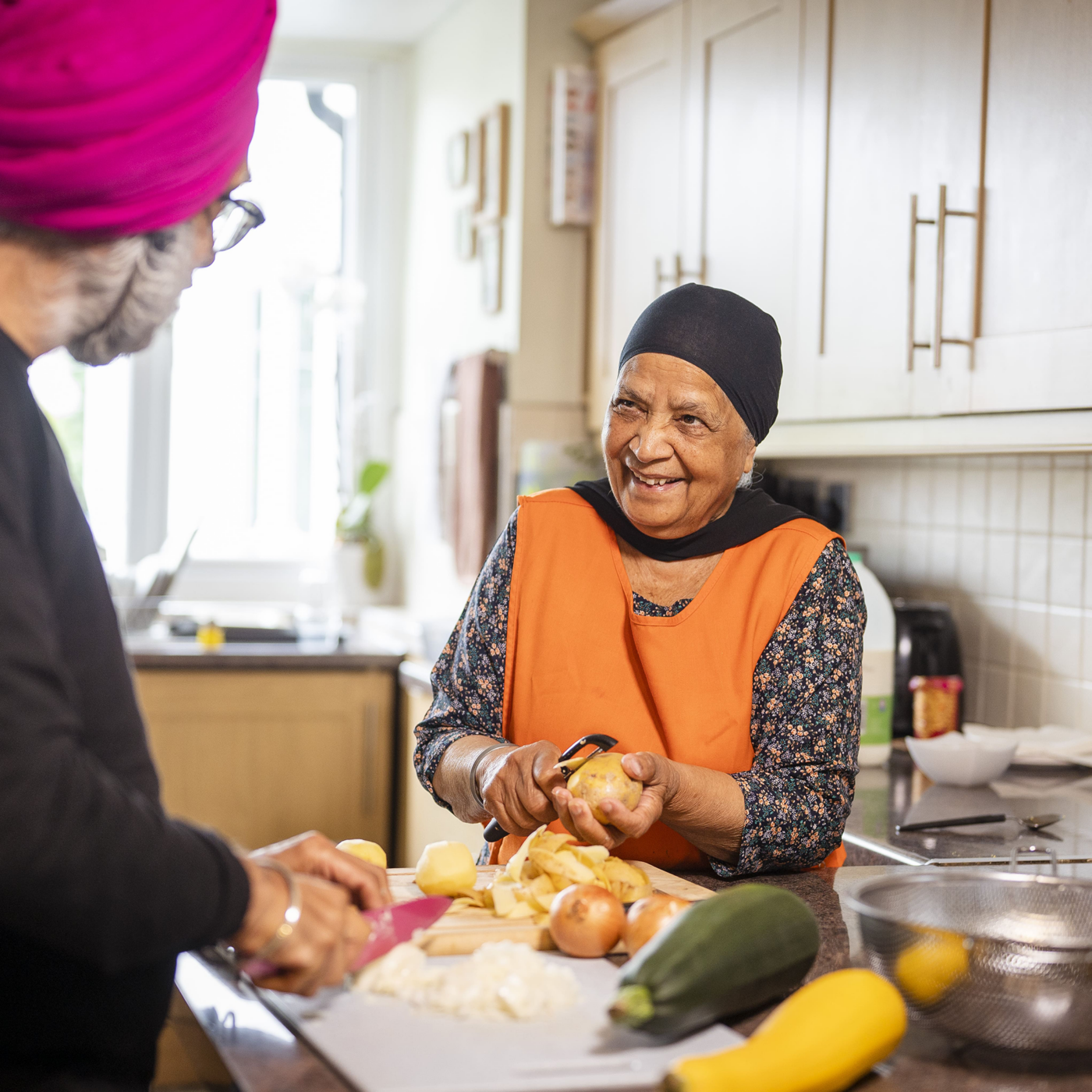What domestic tasks will a home carer look after?
Tags
Home Care
Care isn’t only about providing physical or emotional support – it’s about making sure a person’s environment is comfortable too. By helping to keep things clean and tidy a carer can minimise the risk of illness or injury. It can also help those being cared for to live with dignity and feel proud of their home.
The carers on the Elder platform provide support with a range of everyday tasks around the home – from doing laundry to popping to the local shops. In this guide, we’ll go through some of the essential household tasks that a home carer can do during the average 24 hours of care at home.
When should I consider help at home from a professional carer?
The trigger for needing outside help is different for everyone. If you’re caring for a loved one yourself you may be struggling to balance your sense of responsibility with your work or home life, and need some additional help to keep your loved one safe and well.
If there isn’t any form of support in place yet, there may be some telltale signs to look out for that indicate things around the home are becoming a bit difficult to manage:
- Wearing dirty clothes or the same outfit repeatedly
- The fridge and cupboards are regularly empty, or stocked with out-of-date food
- Eating a poor diet – for example, relying on convenience foods or eating the same meals over and over again
- The general cleanliness of the house has fallen – for example, there may be crumbs and dirt on the carpet, surfaces might be dusty, or the toilet could be noticeably unclean
- Appliances in their home are broken but don’t get fixed
- Clutter is beginning to pile up
- Making constant excuses as to why people can’t visit the house
It’s not always easy to bring up the subject of help with an older person. They may worry that inviting a carer into the home will mean losing their independence. It may help to explain that people of all ages use cleaners, gardeners and meal services to help them in their daily lives. Using outside help is often just a sign that you want to spend your time doing things you enjoy, while the things you find difficult or time-consuming are taken care of.
You may find it helpful to sit down together and write a list of essential weekly tasks. Go through each item and think about whether it’s becoming difficult, and how long it currently takes. Consider how they could put that time to better use with some domestic help.
Meals and nutrition
Home carers understand that preparing nutritious meals is an essential element of living well at home. Skipping meals can be harmful, particularly if someone has special dietary requirements or needs to eat at specific times of day to ensure any medication they’re on works correctly.
Home carers cater to personal tastes and nutritional requirements, and will be on hand to ensure the person they’re caring for has access to plenty of fluids and healthy energy-boosting snacks between meals, on a daily basis.
Meal preparation is a key carer skill too. If the person they’re caring for still enjoys cooking meals a carer will be able to supervise and step in when required to help them stay safe in the kitchen – whether this means helping drain a heavy pan of pasta, or dicing vegetables with a sharp knife.
If an older person already has a Meals on Wheels service in place and is happy with this arrangement, a carer can help ensure these are stored correctly, and that hot meals are prepared properly from frozen.
Even if someone prefers to eat alone, it can still be reassuring to know that their live-in carer will be close by if they need anything. Elder carers can ensure that an older person is safe when chewing and swallowing, which is known to be particularly important for those who are receiving specialist dementia care.
General housekeeping
As mentioned above, keeping a home clean and tidy can be difficult for elderly people. Some medical conditions can make certain housekeeping tasks harder, for example, if you’re living with arthritis and mobility issues pushing a vacuum cleaner or reaching into nooks and crannies to clean can be painful.
A live-in carer will take care of a variety of household chores, from dusting and vacuuming, to keeping the bathroom clean and emptying bins. They’ll help with daily tasks too, such as washing dishes and cleaning surfaces after use.
While regular cleaning is an important part of full-time care, it’s important to remember that a carer’s main focus should always be the person they’re caring for. This means a carer will usually only take on light cleaning tasks like those outlined above. Deep cleaning tasks such as window cleaning, cleaning out a fridge or freezer, or any task that requires moving heavy furniture should be done by a professional cleaning service.
Colin and Dulcie’s story
Dulcie is 102-years-old and lives with her son Colin, his wife Mary, and her Carer Sarah. She has dementia and has had full-time live-in care for over two years.
We talk to the family about the challenges of finding the right care solution for a fiercely independent woman – and how the positive benefits of live-in care with Sarah has transformed all of their lives.
Laundry and ironing
Large piles of laundry can very quickly become overwhelming, and when a task feels almost impossible to complete, the ambience of the whole environment can change. Additionally, the thought of ironing clean clothes can be both overwhelming and dangerous if a person struggles with coordination and is at risk of burning themselves. Whether someone needs a hand changing the bed linens, or assistance lifting wet laundry out of the washing machine and hanging it up to dry, a home carer will often be more than willing to help.
After a short while a carer will recognise which things need prioritising for the week ahead – for example, if a person goes to church on a Sunday, it may call for a particular outfit.
Shopping and running errands
Running errands and going to the shops might not necessarily be activities that you immediately associate with live-in care. However, we understand that some may find it challenging to go outside, or lack the the time or means to run errands themselves. For example, they may no longer drive and find it difficult to take public transport alone. If they’re living in the early stages of dementia or Alzheimer’s they may feel disorientated in shops or find it difficult to count money or remember their PIN.
Live-in carers can assist with tasks such as picking something up from the corner shop or helping with pushing a trolley. Carers will take a gentle approach so that the person they’re caring for feels that essential errands are achievable and easy to complete.
We all know how it feels to have lots of little tasks to complete and seemingly not enough hours in the day to get them all done. Something as simple as having someone on hand to pick up a prescription from the chemist can ease the pressure.
Miscellaneous
There are, of course, a lot of household tasks that aren’t listed above. Everyone has their own priorities and a carer will always work with the person they’re caring for to ensure the important things are taken care of. Some less common tasks may include –
- Watering plants, both indoors and outdoors
- Caring for pets
- Changing light bulbs and batteries
- Polishing silver or brass (this can be a great activity to do together with the person they’re caring for, as it provides a sense of purpose and accomplishment)
If you’d like a carer to help with something in particular, it’s always best to discuss this with them before they begin working with you, to check they’re happy to do so and can do so safely. If arranging care through Elder, you can log information on all essential tasks in your care appraisal.
How Elder can help
Every individual has their routines and ways of approaching particular situations, and may not need assistance in some areas of their lives. However, they might find it helpful to have someone close by who is both willing and capable of lending a helping hand when it is needed. Elder can help you find a home carer who will always be there and provide some much-needed peace of mind for all parties.
As an introductory care agency, Elder will capture as much information as we can about yourself or your elderly relative, in order to match you with a uniquely curated selection of private carers. You’ll have time to review each match carefully, before choosing who you like best. You can even speak to them beforehand too to make sure you’re happy with your choice.
Learn more about home care
Take a look at more Elder guides on how to arrange and adjust to care at home.

What type of background checks should I be doing on a home carer?
What type of background checks should I be doing on a home carer? When you employ a home carer to look after a vulnerable

Elderly nutrition: cooking & meal preparation for the elderly
Elderly nutrition: cooking & meal preparation for the elderly Healthy eating should always be a priority, but as we age, our nutritional needs change

What domestic tasks will a home carer look after?
What domestic tasks will a home carer look after? Live-in carers are at the heart of our comprehensive approach to round-the-clock home care. Care

Home care and self-employed carer insurance
How are home carers insured? Deciding to bring on care at home for a loved one can be an emotional process. Because of this,

How to care for elderly couples and keep them together
How to Care for Elderly Couples When a couple has lived together for many years, they usually want to stay together, however this can

Home help for the elderly
It’s natural to need a little help with things as we age. However, if you or a loved one is finding daily tasks more